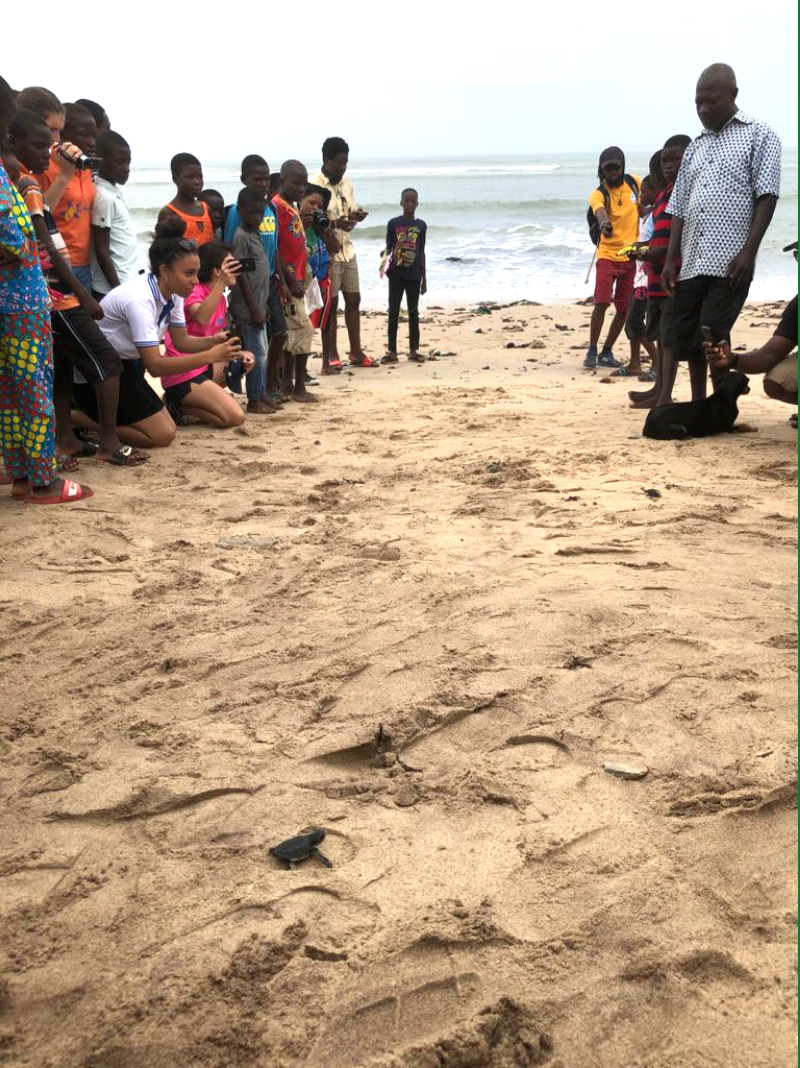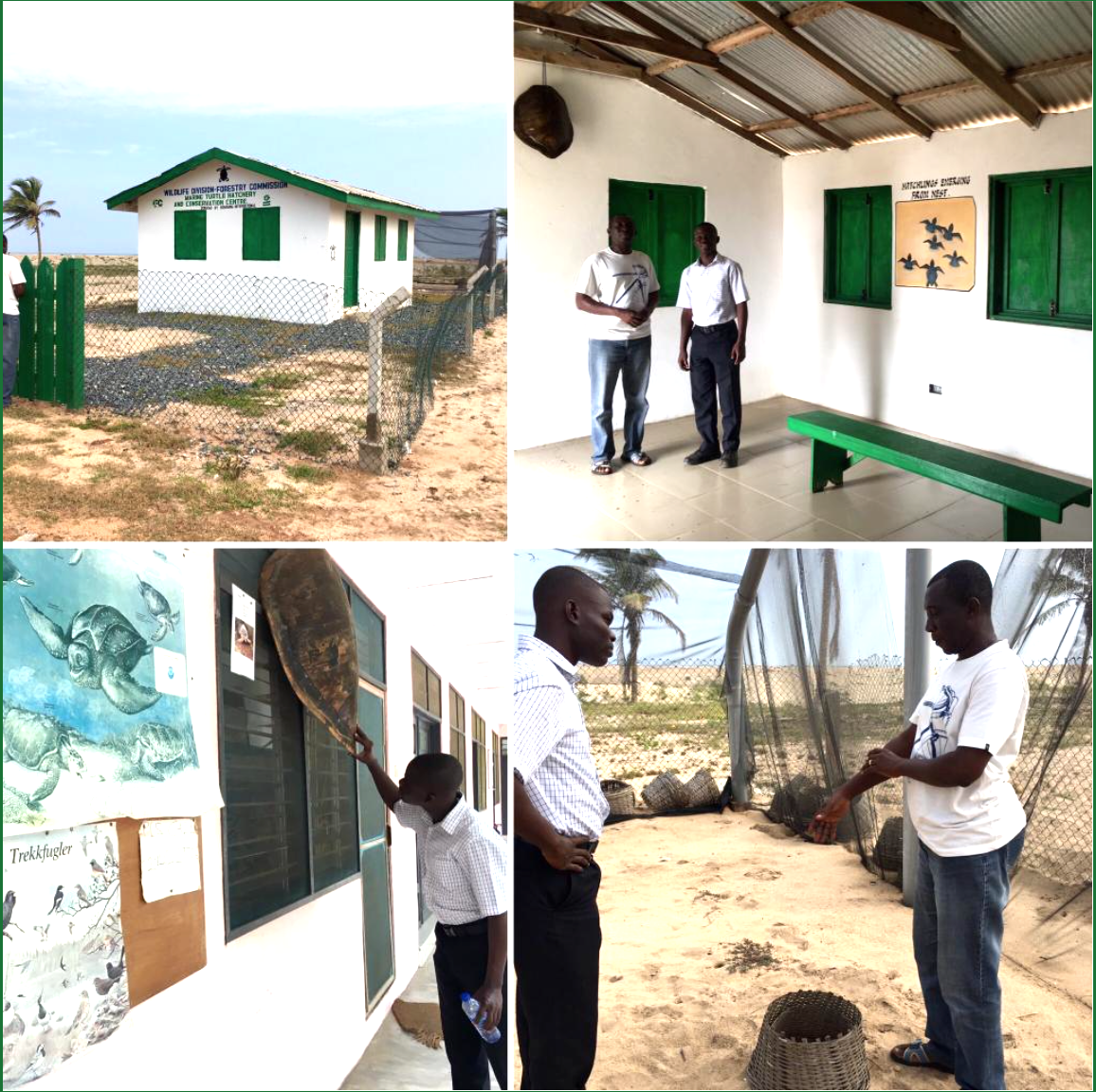Article by: Emmanuel Akumun
Ghana's coastline is vital nesting grounds for five sea turtle species, including the critically endangered Hawksbill turtle. However, these species currently encounter an array of hazards from human beings, ranging from near-shore fishery bycatch to direct harvesting of nesting turtles and their eggs. Increased nest predation by animals like pigs and dogs, alongside habitat degradation and negative impacts stemming from burgeoning beach-based tourism, were also identified as critical threats. The huge amount of waste along our beaches is another issue preventing turtles from finding safe hatching places and for the newborn turtles to find their way back into the ocean.

A beach in Ningo, cleaned by schoolchildren to give baby turtles access to the sea.
The 2nd Ghana National Sea Turtle Conference, a pivotal platform aimed at addressing the mounting challenges faced by sea turtles in Ghana, and advocating collaborative conservation efforts, concluded successfully on August 30th in Accra. The conference, organized and hosted by the Department of Marine and Fisheries Sciences of the University of Ghana, brought together an array of stakeholders dedicated to preserving these marine creatures.
Themed Enhancing Collaborative Efforts for Sea Turtle Conservation, the conference delved into crucial discussions surrounding the protection of sea turtles in the country. The event was a follow-up to the inaugural maiden edition organized by the Wildlife Division of the Forestry Commission which was held in 2018 and marked a significant step forward in fostering collaboration among local sea turtle conservation organizations, governmental bodies, researchers, and fishing communities.
It is worth mentioning that, the theme of the conference speaks to Sustainable Development Goal (SDG) 14, Life Below Water, particularly target 14.1: By 2025, prevent and significantly reduce marine pollution of all kinds, in particular from land-based activities, including marine debris and nutrient pollution. 14.2: By 2020, sustainably manage and protect marine and coastal ecosystems to avoid significant adverse impacts, including by strengthening their resilience, and taking action for their restoration in order to achieve healthy and productive oceans. 14.5: By 2020, conserve at least 10 percent of coastal and marine areas, consistent with national and international law and based on the best available scientific information.
Prominent organizations such as Wildlife and Human Resources Organization (WHRO), A ROCHA Ghana, Strategic Youth Network for Development, Envaserv Research Consult, Keta Ramsar NGO, Environmental Justice Foundation, Ghana Turtle Conservation Project and ourselves, Young Reporters for the Environment (YRE) were among the participants. These entities converged to share insights, strategies, and best practices, collectively aiming to combat the pressing challenges faced by sea turtles on Ghana's coastline.

Turtle Protection and Education Centre, established by the Wildlife Division, Forestry Commission of Ghana in the Ramsar Protection Area in Ada. Here with Dir. Agyemang and Joshua Blay from Eco-Schools Ghana.
Various sessions during the conference featured engaging project and research presentations, highlighting the initiatives undertaken by participating organizations in their efforts to conserve sea turtle populations. The common threats identified include poaching, bycatch from fishing activities, plastic pollution, and the emergence of tourism activities centered around beaches.
The conference culminated with participants engaging in breakout sessions, yielding invaluable insights on best management strategies for Turtle conservation. Recommendations were made for enhanced educational efforts surrounding sea turtle conservation in schools, the necessity for funding, the imperative of collaboration between stakeholders and local communities, law enforcement, heightened awareness campaigns, and improved coordination among various sea turtle projects.
One of the outcomes of the conference was the establishment of National Sea Turtle Day, designated to be observed during the last week of August annually. This initiative is poised to heighten awareness and rally support for Ghana's ongoing conservation of sea turtles.
In a collective statement, conference attendees underscored the importance of united action to protect these invaluable marine species. The event emphasized that it is only through collaborative and concerted efforts that the future of Ghana's sea turtles can be secured, ensuring these amazing creatures continue to grace the country's shores for generations to come.
To keep the conversation going and reach a wider audience, the Young Reporters for the Environment Ghana (YRE) will on September 5th on our weekly SDG Hub program on Asaase Radio, host Lecturer and moderator of the just concluded National Sea Turtle Conference from the Department of Marine and Fisheries Sciences of the University of Ghana, Dr. Andrew Agyekumhene, and Project manager, Wildlife and Human Resources Organization Ghana, Betty Detail Dordzi in the studio to discuss Ghana's sea turtles: threats, reality and prospects.
(If you miss the live program, it will be available on the CeST homepage from Wednesday 6th September 2023: www.Cestint.com)